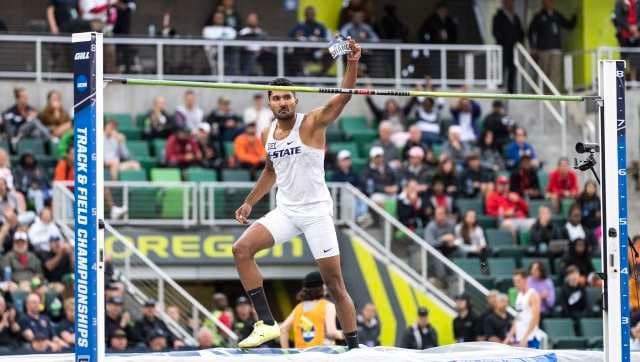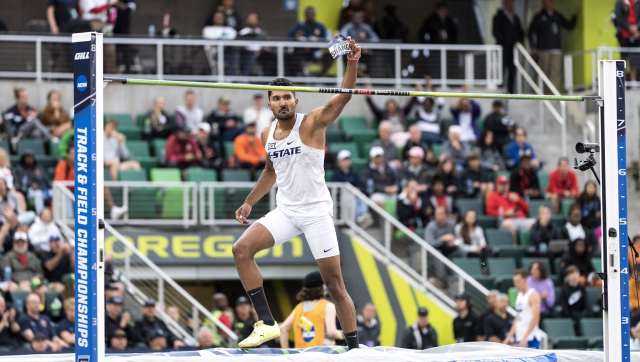Explained: Why athletes are knocking on court’s doors and how sports federations can solve selection issues-Sports News , Firstpost
As courts become the new battleground for Indian athletes, we take a look at the selection controversies and why athletes are not afraid of going against the federation.

High jumper Tejaswin Shankar moved court after not being selected in India squad for CWG. K-State Track/Twitter
High jumper Tejaswin Shankar has become the latest athlete to get relief from a court after being ignored for the Indian team by a sports federation. The 24-year-old national holder who was snubbed by the Athletics Federation of India (AFI) for the 2022 Birmingham Commonwealth Games despite breaching the qualification mark had moved Delhi High Court earlier this month.
The HC then asked AFI to consider Shankar’s selection, following which the federation has added five more athletes, including the national record holder in the high jump, to its squad, subject to Indian Olympic Association agreeing to increase the quota from the current 36.
Before Shankar, four table tennis players had also approached court earlier this year against non-selection. As courts become the new battleground for Indian athletes, we take a look at the selection controversies and why athletes are not afraid of going against the federation.
Selection controversies
Coming back to Shankar, the athlete had breached the qualification mark (2.25m) with a 2.27m jump on 10 June at the NCAA Track and Field Outdoor Championship but the AFI did not select him as it did not recognise the athlete’s jump
“It was clearly mentioned on the website this (Inter States) was the last event where one could try to register the qualification standard for the CWG and Worlds. Tejaswin did not want to be selected. Mr Shankar did not ask to be exempted from the Inter-State Championships. He did not take permission from us before he competed in the USA,” AFI president Adille Sumariwalla had said.
Earlier, young Indian table tennis players Diya Chitale and Swastika Ghosh had approached Delhi HC over their exclusion from the women’s CWG squad. Incidentally, the CWG squad was announced by a committee of administrators that was appointed by the HC itself. Both Chitale and Swastika were eligible for the squad based on the selection methodology followed by the Table Tennis Federation of India (TTFI), however, Manika Batra and Archana Kamath were instead selected. Chitale had since been selected for the team.
Swastika was included as the player on standby, however, her petition was dismissed by Delhi HC as was that of Manush Shah who is the standby for the men’s TT squad for CWG. Archana who was ousted from the women’s squad after Chitale’s inclusion also moved Karnataka HC but to no avail.
In one of the most high-profile cases, paddler Manika moved Delhi HC late last year after she was not included in the team for Asian Championships. She had also accused national coach Soumyadeep Roy of match-fixing during the Olympic qualifiers in Doha in March 2021. Her petition eventually led to the suspension of TTFI.
Why are athletes moving courts?
The growing trend could be attributed to the fact that national sports federations have come under intense scrutiny by courts of law in recent times. Apart from the suspension of TTFI, the All India Football Federation (AIFF) and Hockey India have also been put under the control of court-appointed committee of administrators.
Lawyer Rahul Mehra, who has fought numerous court battles against national sports federations (NSFs), feels the athletes are now ready to fight for their rights given the mysterious ways federations and selectors operate.
“Athletes not having faith in the system is not new. The new thing is now they are fighting for their rights. They are seeing that the court is proactive. Earlier, they would fear that the federation bosses would team up together and they would never get selected if they approached court. There was always favouritism, nepotism, even basics of a selection policy — like an open trial or issuance of advanced notice – are not followed,” Mehra told the Hindustan Times.
“The sports code says that eminent sports persons should be part of the selection panel. How many NSF’s are following this? Most often the selection panel is handpicked by federations.”
What can be done to resolve the selection issues?
While it’s only natural for an athlete to be disheartened after non-selection, a fairly transparent process that gives equal opportunity to deserving candidates would go a long way in resolving the issues. For example, the Wrestling Federation of India earlier followed the policy of sending the wrestler who won the berth to the Olympics, however, since the Tokyo Games it has decided to hold trials.
Another way to move forward is to adopt the best practices from the top-performing sporting nations, as mentioned by Manisha Malhotra, Head of Sports Excellence and Scouting at JSW sports, in her column on The Bridge.
“The majority of the National Federations need to review their selection policies to form the best squad. They can take examples from the selection processes of the countries that have produced proven champions and then inculcate that in our trial system,” she wrote.
“The trials for the US Wrestling Team for the Olympics are one the best ways to pick a team. Performances at major competitions are taken into account while deciding the draw and determining who goes to the finals and who will compete in the semi-finals or earlier.”
Read all the Latest News, Trending News, Cricket News, Bollywood News, India News and Entertainment News here. Follow us on Facebook, Twitter and Instagram.
For all the latest Sports News Click Here
For the latest news and updates, follow us on Google News.

